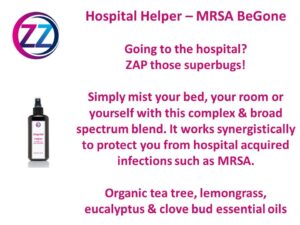Hospital Helper – Essential Oils for MRSA
ZAPnZEN Hospital Helper fights hospital, nursing home, assisted living, rehab, hospice AND yes, hotel and airplane superbugs such as MRSA and can offer superior results over single essential oils. Do not enter the healthcare system or travel without it!

Click below to order.
HOSPITAL HELPER SPRAY $12
If you love the facts like we do – here they are:
The most challenging problem with MRSA (Methicillin-resistant Staphylococcus aureus) is its resistance to antibiotics. A 2004 study shows that essential oils may thwart MRSA’s ability to mutate and resist.
Where does MRSA come from?
Most people get this infection from a hospital or clinic environment. In fact, hospitals are where this superbug emerged.
MRSA was first discovered in the UK in 1961 and in the US in 1981. MRSA became international news in the late 90s. What was a fairly common and benign bacteria — Staphylococcus aureus — has developed into a monster, largely through the development of antibiotics and antibacterial agents employed in hospital. It’s no longer confined to hospitals, so you’ll now hear of community-acquired MRSA as opposed to HA-MRSA (hospital-acquired MRSA). Once an individual acquires this bug it remains with them for life, as there is to date no effective pharmaceutical treatment for MRSA infections.
What are the symptoms?
The symptoms will depend on where the infection appears. It typically appears as a skin infection such as a boil or abscess that just doesn’t seem to heal or go away. The bug can also enter via surgical cuts or wounds. It will often be red, swollen, pus-filled and painful. It’s often mistaken for a spider bite. An MRSA skin infection can lead to what is known as cellulitis. This is where the infection spreads to the deeper levels of skin tissue and fat. The skin around the infection will turn red, hot, swollen and painful.
If it infects the lungs it can lead to pneumonia. The symptoms will be shortness of breath, chills, a worsening fever and cough. Again, like a skin infection it doesn’t appear to go way. If after 3-4 days it hasn’t gotten any better, you should definitely be getting it checked out by a medical practitioner.
In time a MRSA infection can lead to more serious and even fatal conditions such as urinary tract infection, blood poisoning, osteomyelitis and even infection of the inner lining of the heart (endocarditis). In very rare circumstances, MRSA can lead to necrotizing fasciitis — a rapidly spreading “flesh-eating” infection.
How can essential oils help?
Essential oils are the most likely way of fighting superbugs. For one thing they don’t have the side-effects that most antibiotics do. Second, they’re not capable of producing resistant strains of bacteria in the same way that pharmaceuticals do. And there are there reasons for the latter. First, essential oils are quite complex in their makeup (hundreds of compounds) as opposed to a couple of key ingredients in a medicine produced in a lab. Second, while every batch of a pharmaceutical drug is the same, no essential oil is ever twice the same. These two factors make it impossible for bacteria to mount an effective resistance to essential oils.
Sometimes, Staph or MRSA may not respond to a single oil. It’s best to try another type of oil, or move to a blended oil. Blends combine the benefits of several different essential oils into a single, easy to use mixture. Oils with complementary constituents or properties can be combined to target specific types of infections and work in synergistic ways. Blends can also provide secondary benefits, such as tissue healing and enhanced immune response properties.
Why are essential oils so effective?
Traditionally hospitals use bacteria-killing chemicals to clean surfaces, to sterilize instruments and to de-contaminate the skin before surgery. It has been argued that these sterilizing processes inadvertently help to spread bacteria causing them to become resistant to the anti-bacterial agents.
The reason essential oils are so effective is because they are made up of a complex mixture of chemical compounds which the MRSA and other super bug bacteria find difficult to resist. The problem with current treatments is that they are made of single compounds, which MRSA relatively quickly becomes resistant to, so treatment is only successful in around 50% of cases.
‘While a wide range of products currently exist to help prevent the spread of MRSA, these are often unpleasant for patients as their application can cause skin irritation. MRSA is often carried inside the nose which means that patients often have to insert treatments up their nostrils, whereas these essential oils can simply be inhaled to prevent the patient being at risk.
Patients receiving treatment for cancer and leukemia are often left with weakened immune systems, which makes them vulnerable to infection from MRSA.
Which essential oils are best?
Tea Tree Oil
Tea Tree Oil is a high quality oil that contains well over 100 unique chemical constituents. This oil has been the focus of many studies, articles and medical uses. It has been proven in one study superior to standard medical chlorhexidine treatments or a silver preparation for eliminating MRSA colonization (Journal of Hospital Infection (2004;56:283–6)). Tea tree is considered at safe alternative to drug therapies for treating MRSA skin infections.
Note: “Tea Tree” is a generic term which can refer to over 300 varieties of the tea tree plant. Be sure to look for “Melaleuca alternifolia“. Our Tiny Drops Tea Tree Oil is 100% Melaleauca altlernifolia.
Tea Tree Oil effectively kills resistant microorganisms – WESTPORT, June 13, 2000 (Reuters Health) – British and Australian researchers report in the May 2000, issue of the Journal of Antimicrobial Chemotherapy that tea tree oil is effective in killing a variety of resistant microorganisms commonly found in hospitals,
Activity of Tea Tree Oil on Methicillin Resistant Staphylococcus Aureus (MRSA) Infection (Journal); 38: 67 69. – New methods for the control of methicillin resistant Staphylococcus aureus (MRSA) are required to reduce the *increasing incidence of nosocomial MRSA infections and the increasing reservoir of MRSA within the community which lead to increasing numbers of colonized patients and staff. This is further complicated by the recent emergence of S. aureus with reduced susceptibility to vancomycin (VRSA),’which will strain our resources in the near future.
Alternative approaches are thus required. Tea tree oil has been suggested as a possible topical agent with broad-spectrum antibacterial properties which could fulfill this role. It has been shown to be effective against clinical isolates of MRSA both in the UK and in Australia.
Biostructural and Biomolecular Research, University of Western Sydney, Hawkesbury, New South Wales, and Australian Tea Tree Oil Research Institute, Southern Cross University, Lismore, New South Wales, Australia – The essential oil of the tea tree, Melaleuca alternifolia, is a topical antimicrobial, which has been in use since early in this century (Carson and Riley 1993) by Europeans. Tea tree oil has the ability to kill a wide range of medically important micro organisms
Essential oils have been found to kill the deadly MRSA bacteria. Read More:
https://www.ncbi.nlm.nih.gov/pubmed/15555788
Eucalyptus and Tea Tree Oils
A pair of orthopedic surgeons report that two essential oils—eucalyptus and tea tree oil are surprisingly effective at treating methicillin-resistant Staphylococcus aureus (MRSA) infections. Read More:
http://samaritanministries.org/essential-oils-used-to-treat-antibiotic-resistant-infections/
Lemongrass
A study carried out through Weber State University in Utah, the US, and published in 2008 found that of 91 essential oils tested, 78 showed inhibitory activity against the MRSA bacteria. Of these, the most effective was lemongrass. MRSA is not an airborne pathogen — it spreads through physical contact. So if you are visiting or spending time in a hospital – rub some lemongrass on your hands and the soles of your feet. And if you do have a MRSA infection, apply lemongrass oil topically at the site of the infection.
How to use our ZAPnZEN Hospital Helper spray and oil:
- Direct skin application: Be Gone MRSA Spray can be applied to skin cuts and scrapes as a preventative or on boils, abscesses, infected surgical sites and wounds as a treatment. The spray can also be misted all over your body and hair.
- Nose: Apply Be Gone MRSA Spray inside the nose as a preventative or treatment for colonization with MRSA or Staph.
- Internal: We do not suggest that you ingest essential oils without supervision from a trained aromatherapist. However, Be Gone MRSA Spray can be rubbed on the bottom of your feet and will then enter your bloodstream at low levels.
- Lungs: Oils can also be diffused as part of a treatment for infections in the nose and lungs. Spray and inhale is an easy way to get oils into your lungs and into your body without ingesting them.
- Cleaning: After washing your hand with soap and water – spray Be Gone MRSA Spray directly on your hands and rub briskly. You should also spray the air in your hospital room as well as tray tables, linens, etc.
FDA disclaimer: “These statements have not been evaluated by the Food and Drug Administration. This product is not intended to diagnose, treat, cure, or prevent disease.”
Categories: Solutions